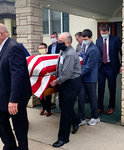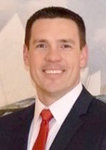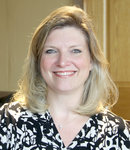




Bob Reese had his end-of-life plan in place. Unfortunately, that plan didn’t include dying amidst the coronavirus pandemic.
Reese passed away on Saturday, April 4 after a nearly two-year battle with esophageal cancer. The longtime Dixon resident, who most recently resided in Eldridge, was 75.
“Dad was very clear what he wanted,” said his son, Michael Reese. “He wanted to have a visitation at Bentley Funeral Home in Durant because of Bentley’s association with veterans, and he had that planned.
“He wanted to have the funeral service at Faith Lutheran in Eldridge, and then the burial of course would be in Dixon. Finally, he wanted a big luncheon at the Dixon American Legion, which was such a vital part of his life. Obviously, none of that worked out.”
The Reese family, like others across Scott County and the country, has been forced to grieve the loss of loved ones like never before.
With much of the nation on lockdown as a result of the highly contagious coronavirus, public visitations have gone by the wayside.
Funerals have been limited to small family gatherings, often with a limit of 10 in attendance, and many families have chosen to do private graveside ceremonies, with Celebration of Life services planned at a later date.
In addition, people are going through the dying process alone, unable to be comforted by loved ones, as most hospitals and long-term care facilities have strict visitation polices to try and keep the pandemic at bay.
“It’s a sad, sad time to live, and a sad, sad time to die,” said Nick Haut, a funeral director at Halligan-McCabe-DeVries Funeral Home in Davenport. “It’s just a struggle. It’s a weird time. Death is lonely as it is, and hopefully we don’t ever have to go through this again.”
“Families are having to go through the grief of losing a loved one, which in itself is difficult,” said Jon Chambers, funeral director at McGinnis-Chambers Funeral Home, with locations in Bettendorf and Eldridge. “Visitations are therapeutic, and the fact they cannot memorialize them keeps them from a real sense of closure.”
Bob Reese was diagnosed with Stage 4 esophageal cancer on Aug. 29, 2018, when it was determined that a tumor was keeping him from swallowing and keeping food down.
He underwent chemotherapy and radiation treatments, and 18 months ago had surgery to put a feeding tube into his stomach. The tube caused overwhelming pain, and he became afraid to leave the house because he never knew when it would flare up.
“Other than the pain, he was otherwise healthy,” said Michael. “It was hard to watch because you had this very active man who was always getting out of the house to do things, and then all of a sudden not being able to do anything.”
Last August, doctors told the family that Bob’s body was no longer responding positively to the chemo. He was placed on home hospice, and that’s where he died in the early morning hours of April 4, with his wife, Pat, and Michael, at his bedside.
“He wanted to be at home. He wanted to be around Mom,” said Michael. “If Dad had not been home, and would have been in hospice outside the home, we would not have been able to be with him when he passed.
“Some families are dealing with that, in addition to the dying. It’s so sad to think that’s happening.”
With that said, the current pandemic still had an effect on Bob’s final days, and also his funeral.
Up until the middle of March, Michael, who lives in Park View, and who is the vocal director at Davenport Central High School, visited his parents regularly. The pandemic changed that.
“After the first week, when it was announced schools would close, Mom said she’d been talking to the hospice nurses and listening to the news,” said Michael. “She said things were starting to spread more, and she thought it was just a good idea to talk on the phone or from the porch to basically have some separation.
“We did that for a couple of weeks, and I feel so blessed to only be five minutes away, and I could come over when Mom needed me.”
Bob took a turn for the worse at the end of March, and the hospice nurse told Pat that it might be a good idea for Michael and his sister, Kim (who lives in Des Moines), to come and visit.”
“Mom first said, ‘No,’ and that we were keeping our distance,” said Michael. “The nurse then said that this time she thought it would be OK for them to come, as long as they are practicing as much social distancing on their own as they can. She said she thought we should be there.”
Michael began stopping by every day, and Kim came to stay over for a couple of nights. On Thursday, April 2, Bob had a “really incredible” day, and was full of mental energy.
“We had done our research,” said Michael, “and with people close to the end of their lives, one of the signs that someone is near the end is that they have a big uptick in energy.
“He had it for about half a day, and he told my sister she could go home. I think he knew he was going. I don’t think he really wanted her to be there for that moment.”
Kim left town early Friday evening, and Michael went home. Pat called him three hours later and said she could tell that Bob was slipping.
“I went over right away, and I was really there more to help her get through it,” said Michael. “It was pretty obvious by 10:30 that he was going, and he died shortly after midnight.
“I feel blessed to be have been by his side and holding his hand, with my mom across the hospital bed from me. We were both able to be there. That part was comforting, and I’m so thankful that he did go when he went.”
Funeral plans
The family was well aware of Bob’s funeral wishes, but the coronavirus pandemic changed all that. They couldn’t even meet with Bob’s pastor, Rev. Carrie LaPlante, in person.
“I’d seen Pastor Carrie, but never spoken to her,” said Michael. “It was nice to at least connect over the phone. I was so glad I was able to be with Mom and have that conversation with her and Pastor Carrie.
“It was weird because I’m having a conversation about my dad and trying to say some emotional things and personal stories, and I’m not really sure who I’m talking to on the other end.”
It was difficult for LaPlante as well.
“The hardest part was not being able to be with them in their time of need like we would have before,” she said. “Normally we meet the family at church and sit around and share stories. Having to do that ministry over the phone was difficult.”
“I was really impressed with Pastor Carrie,” said Michael. “She took the knowledge she had of Mom and Dad, and some of the things we were talking about, and made it seem like she’d known my dad and me for our entire lives. I thought she did a wonderful job.”
There was no public visitation, just a funeral at Bentley’s on Tuesday, April 7, with only 10 people in attendance.
“We felt lucky that we were able to have the funeral at Bentley’s,” said Michael. “We have such a small family, and it was my sister’s family and my family, and then my dad’s brother, Don, along with my mom. That made 10.
“I would never want to call what we’re going through a blessing, because people are losing their lives and it’s awful, but I saw the comfort in having the service the way it was.
“We didn’t have a visitation, but instead we had a gathering of the family, together. It was very peaceful and calm. It was emotional, and I felt we couldn’t be more in the throes of sorrow. We could laugh or cry, and didn’t have to change our behavior because of others in the room.”
Still, he felt bad for his mom. The Reeses were integral parts of the Dixon community, and Don managed the American Legion, where he coordinated the fish and chicken suppers.
“I feel bad for Mom because she wasn’t able to make those connections with her friends, and the friend base that she and dad had built up over the years,” said Michael. “They didn’t get to hug each other, or spend time together. From that standpoint, I hurt for her because she didn’t get that type of closure.”
“The hardest part for me was seeing Pat at the funeral,” said LaPlante. “I just wanted to give her this big hug, but I couldn’t.”
Everybody at the funeral wore masks.
Graveside service
Michael, his brother-in-law, their sons and Don all served as pallbearers and carried the casket out of the church. It was a special time, but the trip to the Dixon Cemetery was just as memorable.
Bob loved to drive the country roads, and the funeral director took his casket on a meandering, scenic path to its final resting place.
When the procession pulled into the cemetery, the family was caught off guard.
“My family and I were crying and laughing about how Dad would have loved that drive,” said Michael, “and then when we pulled into the cemetery there were people gathered all around the gravesite."
There were at least 10 from Don’s family, and at least another 20 from the community that showed up.
Most everyone was wearing a mask.
“The funeral director went and thanked them for coming, but asked them to spread out. They made a big ring around the gravesite. That was emotional. I think that said a lot about who Dad was, and how he was perceived by the community, and what people think of Mom. They were trying to do anything they could to be there for her.”
Also in attendance were soldiers from the Rock Island Arsenal, and representatives of the Dixon Legion.
Military rites were accorded, including a 21-gun salute, and Rick Stoltenberg, commander of the Dixon Legion, and a close friend of the Reeses, presented the flag to Pat.
“We thought we were going to go to the cemetery, and it was going to be our 10 people, the pastor and soldiers from the arsenal and representatives of the Dixon Legion,” said Michael.
“It was all of that, but also people from the community all spread around. It was really touching.
“I wish I could have stepped outside of my body for a moment and taken some pictures at the gravesite. It was such a powerful scene.”
While there was no public visitation, or huge luncheon, the community has supported the Reeses with letters, cards and donations to the Legion.
Michael is hoping there will be a time when people will be able to gather and remember his father.
“Even though I found the day to be comforting, I really feel for Mom,” he said. “I really hope that when we all start to feel a little bit more comfortable, and we hopefully find a cure for this virus, we can get together.
“My hope is that when Dad’s stone comes, maybe there will be an opportunity for us to have the plan that Dad wanted, to gather back at the legion with family and friends together, and have a celebration for someone that continually gave for others.”